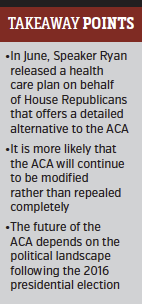ADVERTISEMENT
Can the Affordable Care Act Really be Repealed?
 The future of the Affordable Care Act (ACA) has been anyone’s guess, as the US presidential election season continues and the two major parties have identified their presumptive presidential nominees. While it is clear that the two candidates, Democrat Hillary Clinton and Republican Donald Trump, differ greatly with respect to their plans for the law, what is less clear is what Republicans will do if Mr Trump wins the election, their party retains control of the US Congress, and they are allowed to enact their policy agenda unimpeded.
The future of the Affordable Care Act (ACA) has been anyone’s guess, as the US presidential election season continues and the two major parties have identified their presumptive presidential nominees. While it is clear that the two candidates, Democrat Hillary Clinton and Republican Donald Trump, differ greatly with respect to their plans for the law, what is less clear is what Republicans will do if Mr Trump wins the election, their party retains control of the US Congress, and they are allowed to enact their policy agenda unimpeded.
Mr Trump is only partially responsible for articulating the GOP’s health care strategy, sharing that charge with US House of Representatives Speaker Paul Ryan, with whom he currently holds an uneasy alliance. Speaker Ryan has agreed with Mr Trump’s stated plan to fully repeal Obamacare on “day one” of his presidency, asserting that the ACA “cannot be fixed” and “must be fully repealed so we can start over and take a new approach.”
Additionally, in June, Speaker Ryan released a health care plan on behalf of House Republicans that offers a detailed alternative to the ACA.
Titled “A Better Way,” the Ryan plan would:
• Eliminate the insurance mandate, and instead offer a flat tax credit to those who need to purchase individual insurance;
• Allow insurance companies to sell their plans across state lines;
• Roll back the ACA’s Medicaid expansion and instead give each state a fixed amount for each beneficiary or a lump sum of federal dollars;
• Allow states to impose work requirements for those Medicaid recipients who are able to work, and also permit states to charge premiums or limit benefits for certain beneficiaries;
• Modify the popular provision that prevents coverage denial or charging high premiums to those with preexisting conditions by requiring continuous coverage;
• Alter the tax-free treatment that employees receive on contributions their employers make to benefit plans, enacting taxes on only the most generous plans; and
• Gradually increase the age of Medicare eligibility beginning in 2020 to correspond with that of the Social Security program.
The plan offers a clearer picture of what the future would hold should Republicans succeed in their repeal efforts. By some estimates, 19 to 21 million people would lose coverage if the ACA is repealed, though it is assumed that a number of them would be able to pick up coverage under the Ryan plan using proposed tax credits.
Still, some experts point out that a plan of substance has been long overdue from the GOP. “I am pleased to see that the House Republicans have offered constructive revisions to the ACA,” offers Arthur F Shinn, PharmD, president of Managed Pharmacy Consultants, LLC. “I think this is a positive first step.”
We asked our panel, all members of FRMC’s editorial advisory board, to weigh in on the Republican alternative to the ACA and what it means for the party’s ongoing efforts to repeal the health care law.
Repeal May Not Be Necessary for Change
Is “repeal and replace” even possible? The experts we spoke with continue to hold to their view that the ACA, in some form, is here to stay. “The US has never been good at taking away benefits,” says Norm Smith, president of Viewpoint Consulting, Inc, which surveys managed markets decision-makers for the pharmaceutical industry.
The ACA’s wording gives Republicans a chance to make the changes it wants to make without repealing the law. “There are 1100 places in ACA where the words, ‘The Secretary shall’ appears,” says Mr Smith, all of which present the opportunity for the law to be adjusted. “Any piece of complex legislation that is put in place should be changed over time.”
In fact, the rumblings of change are already afoot, says Mr Smith. The Centers for Medicare & Medicaid Services is calling for a tightening of the long enrollment periods stipulated in the ACA in order to cut down on people signing up only when they are sick and quitting plans when they no longer need coverage. “You don’t need a Congressional vote to make such a change.”
Still, Mr Smith continues to believe that the Republicans’ call for a full repeal is an effort to “gin up the base.” He maintains that the GOP knows that repealing the ACA is not possible. Others agree that the Trump/Ryan call for a full repeal is largely posturing.
“It is totally unrealistic and ill-advised,” offers Gary Owens, MD, president of Gary Owens Associates, a medical management and pharmaceutical consultancy firm. He believes repealing and replacing will be repeating bad history. “One of the flaws of the ACA was that, in the political zeal to get something done, the necessary analytical and planning processes were truncated. Therefore, there were some portions of the act that were ill conceived and destined to be modified due to their sheer impracticalities. Doing something similar without proper planning would be a disaster.”
“Repeal becomes less and less likely over time as increasing benefits—financial and otherwise—are demonstrated,” says Barney Spivack, MD, national medical director, Medicare Case & Condition Management, OptumHealth.
Despite its weaknesses, the ACA is projected to decrease health care expenses over time. Recently reported findings of a study from the Urban Institute and the Robert Wood Johnson Foundation showed that national health care spending is projected to be less than expected since the passage of the ACA, with recent forecasts estimating $2.6 trillion less in spending than previous estimates for the 5-year period of 2014-2019. Additionally, the same study found that health insurance enrollment rates have increased in the United States.
“That, combined with an increasing awareness of benefits [offered under the ACA], makes repeal a remote possibility.”
Dr Owens concurs: “Even with its flaws, ACA is better than what came before,” he explains. “A better approach would be to take a look at what is and isn’t working. Find ways to keep the good and make it better going forward.”
ACA’s Soft Spots for Republicans to Target
Assuming the ACA is here to stay, which, if any, of the Ryan provisions are likely to see the light of day?
To answer this question, Mr Smith goes back to CMS’s recent call to shorten lengthy enrollment periods. “Under the Ryan plan you can’t just drop coverage when you get better,” he says. “[Limiting that] has value.”
Similarly, allowing states to require able-bodied recipients to work, as well as to alter premiums and coverage for certain beneficiaries, “also makes a lot of sense,” explains Mr Smith. “Some people in California are making $93,000 annually and qualifying for MediCal.” He warns, however, that making this change will be challenging and might be perceived as racially discriminatory.
Dr Spivack thinks the Republican strategy of offering repeal as an opening salvo, but settling for an unbundling of certain provisions, sounds reasonable—“as long as what’s unbundled doesn’t irreparably ruin the law from a financial, sustainability, or benefit perspective.”
It might be best for Republicans to focus on creating a universal benefit package that serves as a “basic plan that would hopefully be less costly and allow healthier individuals to sign up for coverage,” says Dr Owens. “Get rid of the metallic-level plans in favor of one base plan, and then allow the carriers to offer appropriate buy-up options.”
What Should Be Left Alone
Mr Smith agrees with Dr Spivack that Republicans need to pick the right provisions to modify. “If you change certain aspects it will blow up the whole thing. For one, you’ve got to have everyone in the [insurance risk] pool,” which makes removing the mandate problematic.
Selling across state lines sounds reasonable, until you consider how long it will take to cut through the state bureaucracies, he explains. “The insurance commissioners would be giving up their turf, which is not something they’d be willing to do easily.”
And then there is the idea of raising the age of Medicare eligibility, which many believe is politically unwise. It seems a risky move in the face of the baby-boomer base and a powerful AARP lobby. Still, Mr Smith thinks the Republicans have a chance of getting it through.
For one, they’re only asking for the Medicare eligibility age to match that of Social Security. Plus, there is precedence: the US Congress raised the retirement age in the 1980s. “People are living longer, so it makes sense to raise the age” when people become eligible for Medicare, says Mr Smith.
What Lies Ahead for the ACA
In the end, “the future very much depends on the election,” explains Anthony Morreale, PharmD, assistant chief consultant for clinical pharmacy services and health services research, Department of Veterans Affairs. The Ryan plan “is simply a framework to start negotiations. If the Democrats don’t take the White House and the Republicans maintain control of the House and Senate, then I think there is a real chance of reforming the existing plan.”





















